Integrating Strategies for Gender Equality in Global Organizations
VerifiedAdded on 2023/01/18
|10
|2203
|62
AI Summary
This article explores how companies integrate strategies for gender equality in global organizations. Annotated bibliographies provide insights and recommendations for further research.
Contribute Materials
Your contribution can guide someone’s learning journey. Share your
documents today.
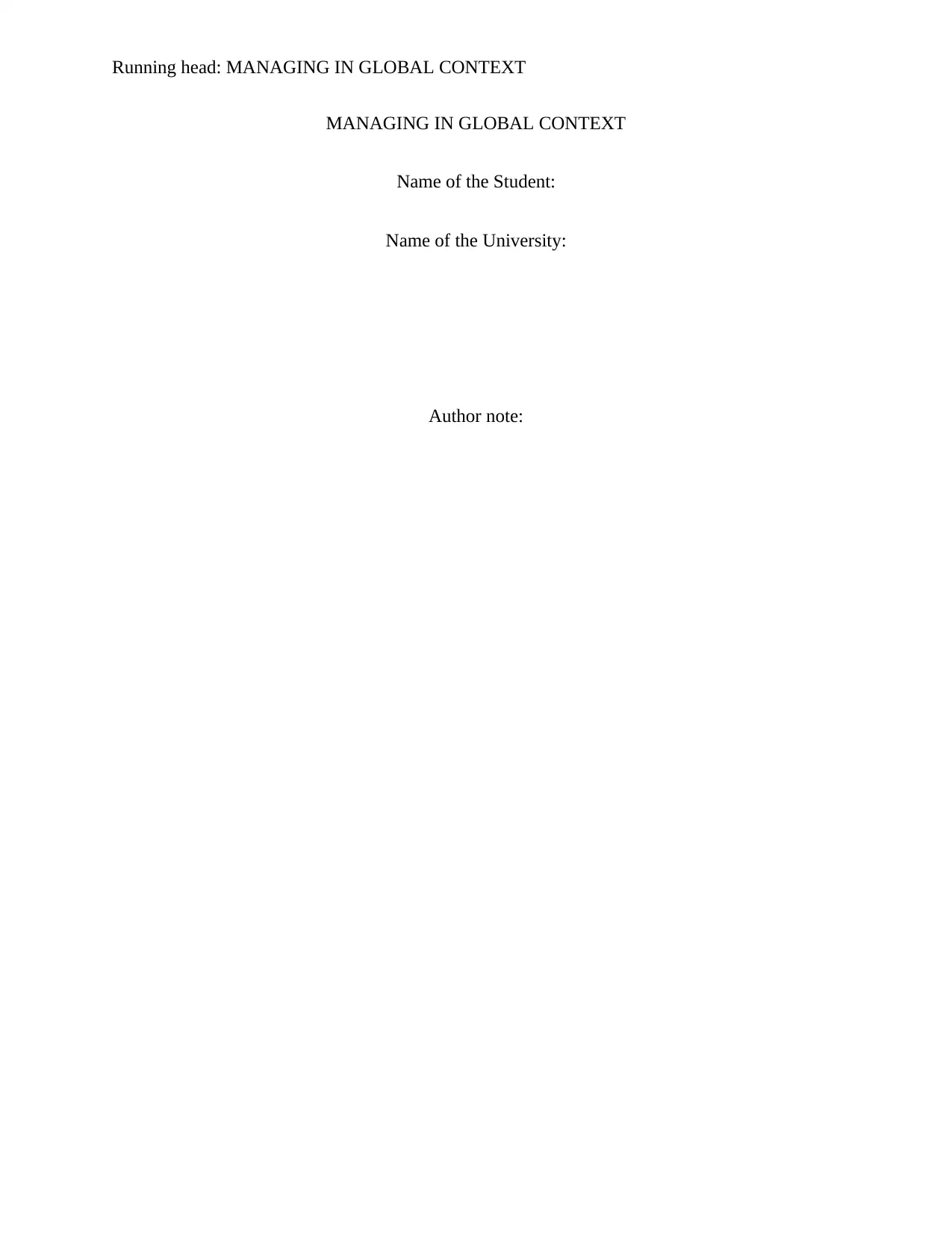
Running head: MANAGING IN GLOBAL CONTEXT
MANAGING IN GLOBAL CONTEXT
Name of the Student:
Name of the University:
Author note:
MANAGING IN GLOBAL CONTEXT
Name of the Student:
Name of the University:
Author note:
Secure Best Marks with AI Grader
Need help grading? Try our AI Grader for instant feedback on your assignments.
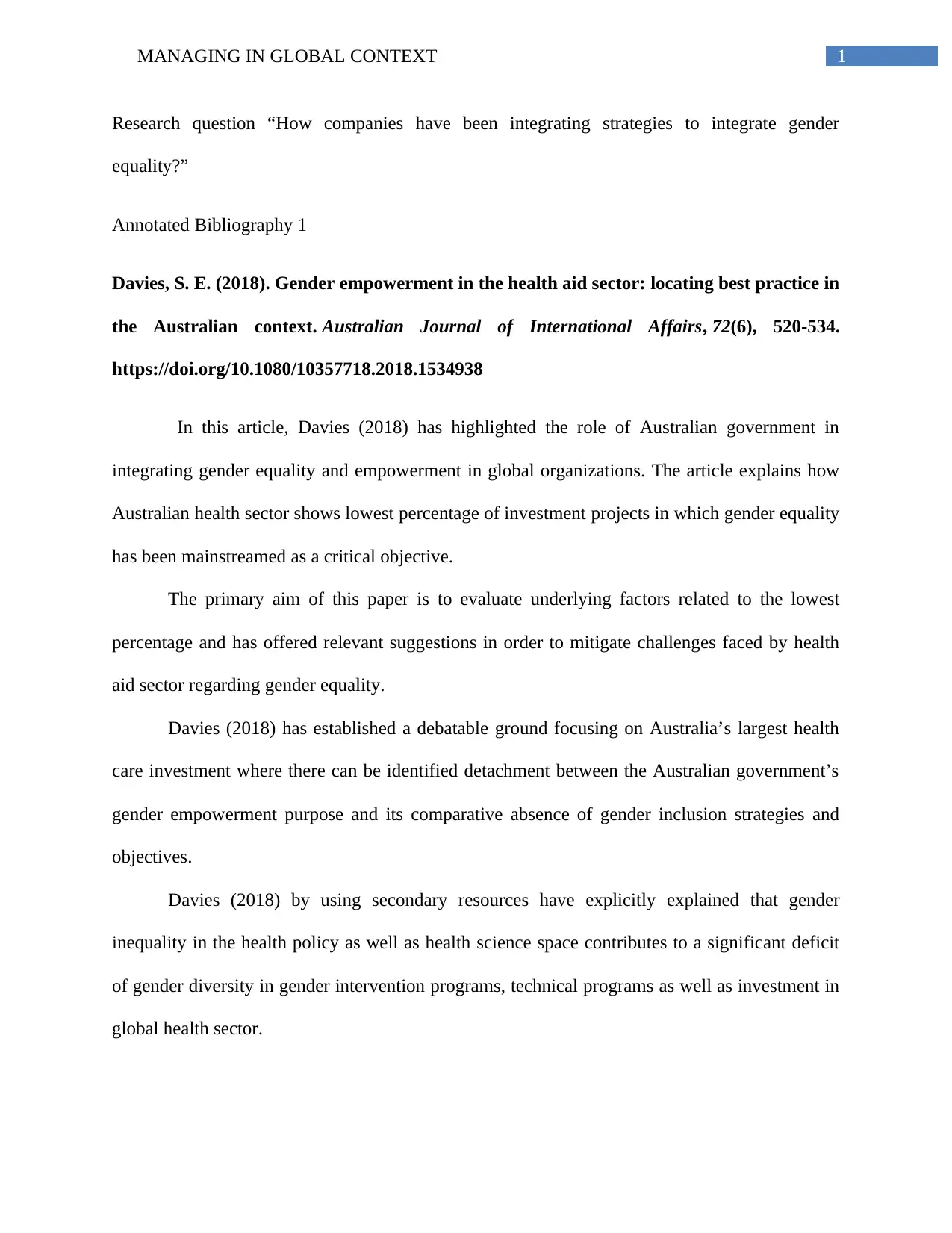
1MANAGING IN GLOBAL CONTEXT
Research question “How companies have been integrating strategies to integrate gender
equality?”
Annotated Bibliography 1
Davies, S. E. (2018). Gender empowerment in the health aid sector: locating best practice in
the Australian context. Australian Journal of International Affairs, 72(6), 520-534.
https://doi.org/10.1080/10357718.2018.1534938
In this article, Davies (2018) has highlighted the role of Australian government in
integrating gender equality and empowerment in global organizations. The article explains how
Australian health sector shows lowest percentage of investment projects in which gender equality
has been mainstreamed as a critical objective.
The primary aim of this paper is to evaluate underlying factors related to the lowest
percentage and has offered relevant suggestions in order to mitigate challenges faced by health
aid sector regarding gender equality.
Davies (2018) has established a debatable ground focusing on Australia’s largest health
care investment where there can be identified detachment between the Australian government’s
gender empowerment purpose and its comparative absence of gender inclusion strategies and
objectives.
Davies (2018) by using secondary resources have explicitly explained that gender
inequality in the health policy as well as health science space contributes to a significant deficit
of gender diversity in gender intervention programs, technical programs as well as investment in
global health sector.
Research question “How companies have been integrating strategies to integrate gender
equality?”
Annotated Bibliography 1
Davies, S. E. (2018). Gender empowerment in the health aid sector: locating best practice in
the Australian context. Australian Journal of International Affairs, 72(6), 520-534.
https://doi.org/10.1080/10357718.2018.1534938
In this article, Davies (2018) has highlighted the role of Australian government in
integrating gender equality and empowerment in global organizations. The article explains how
Australian health sector shows lowest percentage of investment projects in which gender equality
has been mainstreamed as a critical objective.
The primary aim of this paper is to evaluate underlying factors related to the lowest
percentage and has offered relevant suggestions in order to mitigate challenges faced by health
aid sector regarding gender equality.
Davies (2018) has established a debatable ground focusing on Australia’s largest health
care investment where there can be identified detachment between the Australian government’s
gender empowerment purpose and its comparative absence of gender inclusion strategies and
objectives.
Davies (2018) by using secondary resources have explicitly explained that gender
inequality in the health policy as well as health science space contributes to a significant deficit
of gender diversity in gender intervention programs, technical programs as well as investment in
global health sector.
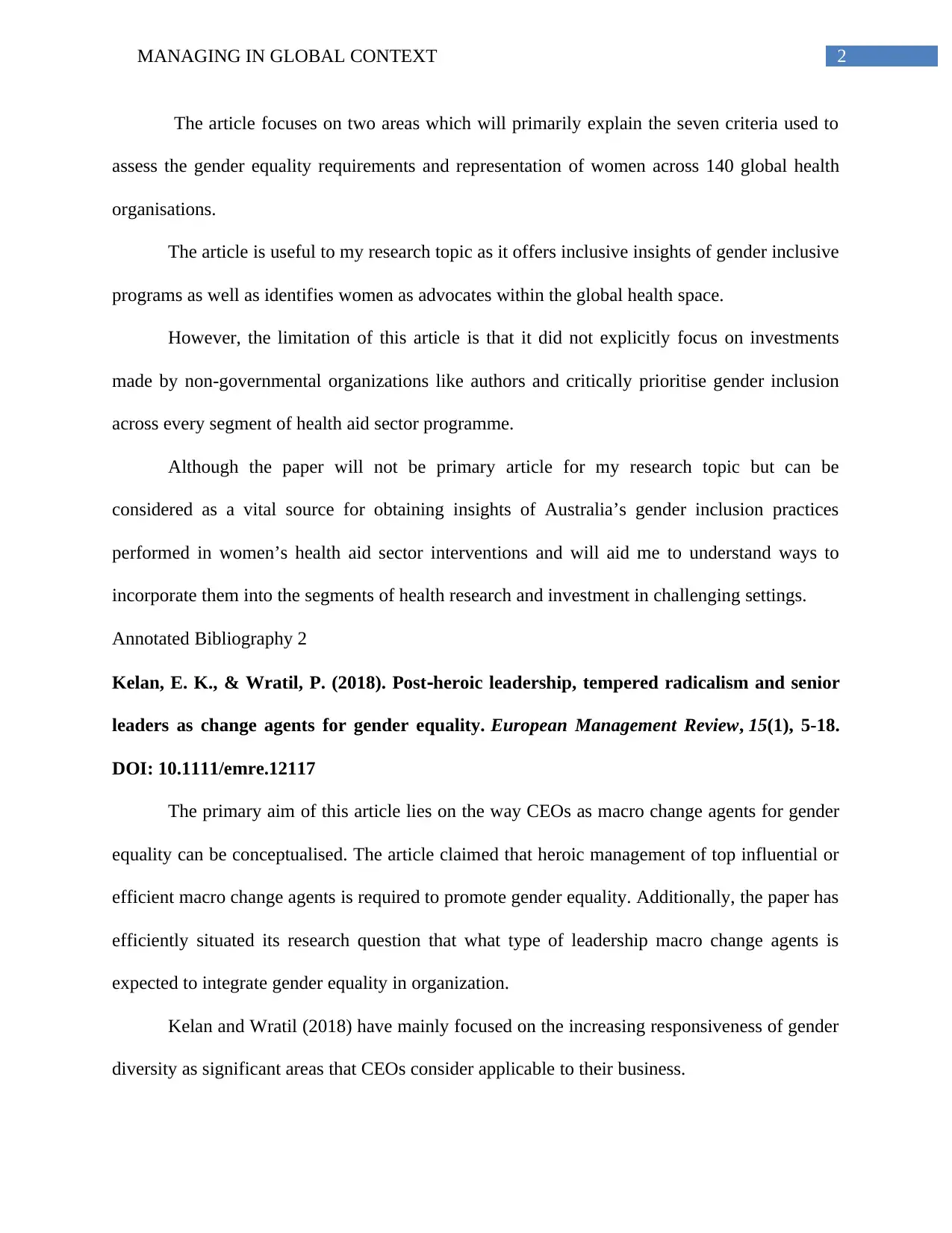
2MANAGING IN GLOBAL CONTEXT
The article focuses on two areas which will primarily explain the seven criteria used to
assess the gender equality requirements and representation of women across 140 global health
organisations.
The article is useful to my research topic as it offers inclusive insights of gender inclusive
programs as well as identifies women as advocates within the global health space.
However, the limitation of this article is that it did not explicitly focus on investments
made by non-governmental organizations like authors and critically prioritise gender inclusion
across every segment of health aid sector programme.
Although the paper will not be primary article for my research topic but can be
considered as a vital source for obtaining insights of Australia’s gender inclusion practices
performed in women’s health aid sector interventions and will aid me to understand ways to
incorporate them into the segments of health research and investment in challenging settings.
Annotated Bibliography 2
Kelan, E. K., & Wratil, P. (2018). Post‐heroic leadership, tempered radicalism and senior
leaders as change agents for gender equality. European Management Review, 15(1), 5-18.
DOI: 10.1111/emre.12117
The primary aim of this article lies on the way CEOs as macro change agents for gender
equality can be conceptualised. The article claimed that heroic management of top influential or
efficient macro change agents is required to promote gender equality. Additionally, the paper has
efficiently situated its research question that what type of leadership macro change agents is
expected to integrate gender equality in organization.
Kelan and Wratil (2018) have mainly focused on the increasing responsiveness of gender
diversity as significant areas that CEOs consider applicable to their business.
The article focuses on two areas which will primarily explain the seven criteria used to
assess the gender equality requirements and representation of women across 140 global health
organisations.
The article is useful to my research topic as it offers inclusive insights of gender inclusive
programs as well as identifies women as advocates within the global health space.
However, the limitation of this article is that it did not explicitly focus on investments
made by non-governmental organizations like authors and critically prioritise gender inclusion
across every segment of health aid sector programme.
Although the paper will not be primary article for my research topic but can be
considered as a vital source for obtaining insights of Australia’s gender inclusion practices
performed in women’s health aid sector interventions and will aid me to understand ways to
incorporate them into the segments of health research and investment in challenging settings.
Annotated Bibliography 2
Kelan, E. K., & Wratil, P. (2018). Post‐heroic leadership, tempered radicalism and senior
leaders as change agents for gender equality. European Management Review, 15(1), 5-18.
DOI: 10.1111/emre.12117
The primary aim of this article lies on the way CEOs as macro change agents for gender
equality can be conceptualised. The article claimed that heroic management of top influential or
efficient macro change agents is required to promote gender equality. Additionally, the paper has
efficiently situated its research question that what type of leadership macro change agents is
expected to integrate gender equality in organization.
Kelan and Wratil (2018) have mainly focused on the increasing responsiveness of gender
diversity as significant areas that CEOs consider applicable to their business.
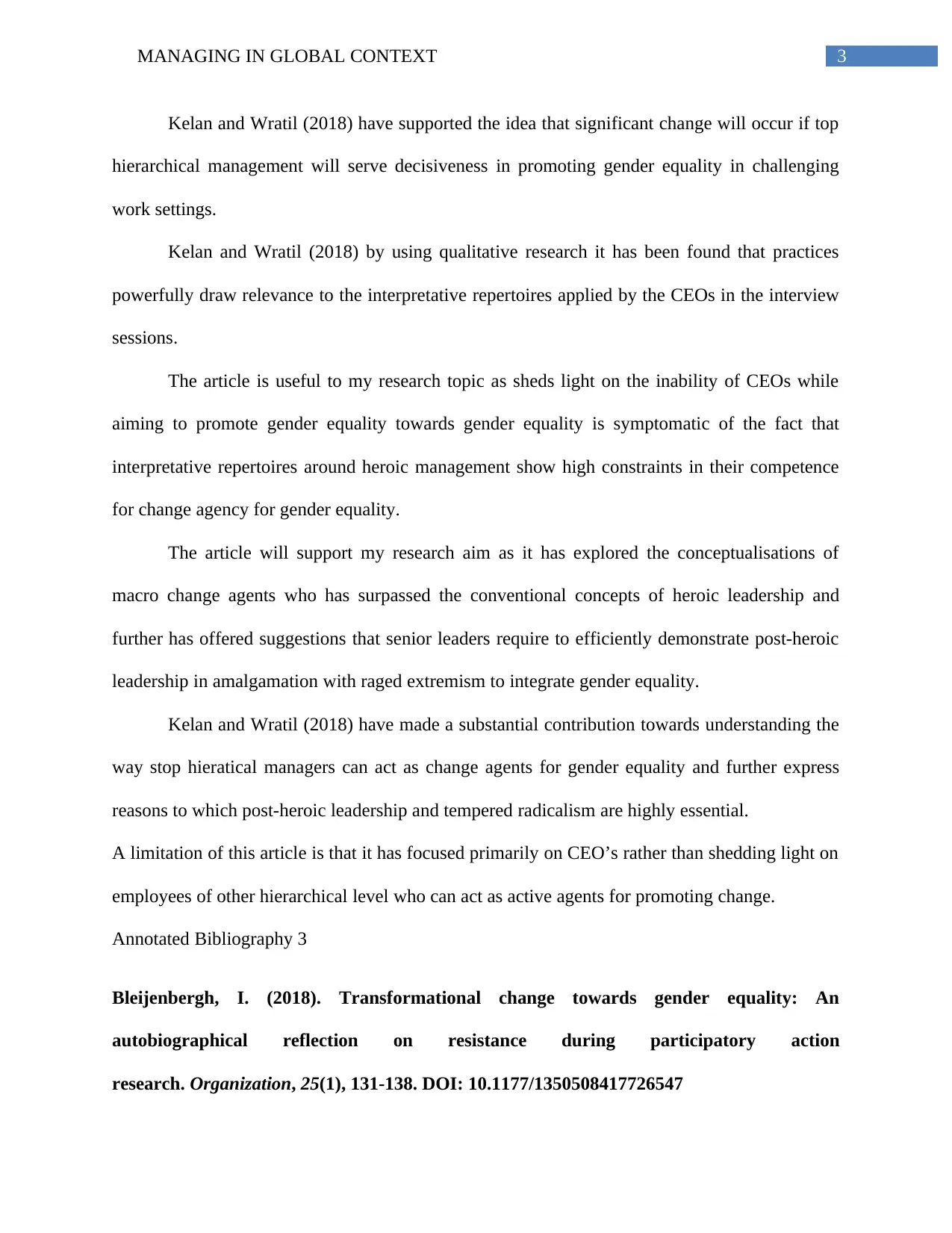
3MANAGING IN GLOBAL CONTEXT
Kelan and Wratil (2018) have supported the idea that significant change will occur if top
hierarchical management will serve decisiveness in promoting gender equality in challenging
work settings.
Kelan and Wratil (2018) by using qualitative research it has been found that practices
powerfully draw relevance to the interpretative repertoires applied by the CEOs in the interview
sessions.
The article is useful to my research topic as sheds light on the inability of CEOs while
aiming to promote gender equality towards gender equality is symptomatic of the fact that
interpretative repertoires around heroic management show high constraints in their competence
for change agency for gender equality.
The article will support my research aim as it has explored the conceptualisations of
macro change agents who has surpassed the conventional concepts of heroic leadership and
further has offered suggestions that senior leaders require to efficiently demonstrate post-heroic
leadership in amalgamation with raged extremism to integrate gender equality.
Kelan and Wratil (2018) have made a substantial contribution towards understanding the
way stop hieratical managers can act as change agents for gender equality and further express
reasons to which post-heroic leadership and tempered radicalism are highly essential.
A limitation of this article is that it has focused primarily on CEO’s rather than shedding light on
employees of other hierarchical level who can act as active agents for promoting change.
Annotated Bibliography 3
Bleijenbergh, I. (2018). Transformational change towards gender equality: An
autobiographical reflection on resistance during participatory action
research. Organization, 25(1), 131-138. DOI: 10.1177/1350508417726547
Kelan and Wratil (2018) have supported the idea that significant change will occur if top
hierarchical management will serve decisiveness in promoting gender equality in challenging
work settings.
Kelan and Wratil (2018) by using qualitative research it has been found that practices
powerfully draw relevance to the interpretative repertoires applied by the CEOs in the interview
sessions.
The article is useful to my research topic as sheds light on the inability of CEOs while
aiming to promote gender equality towards gender equality is symptomatic of the fact that
interpretative repertoires around heroic management show high constraints in their competence
for change agency for gender equality.
The article will support my research aim as it has explored the conceptualisations of
macro change agents who has surpassed the conventional concepts of heroic leadership and
further has offered suggestions that senior leaders require to efficiently demonstrate post-heroic
leadership in amalgamation with raged extremism to integrate gender equality.
Kelan and Wratil (2018) have made a substantial contribution towards understanding the
way stop hieratical managers can act as change agents for gender equality and further express
reasons to which post-heroic leadership and tempered radicalism are highly essential.
A limitation of this article is that it has focused primarily on CEO’s rather than shedding light on
employees of other hierarchical level who can act as active agents for promoting change.
Annotated Bibliography 3
Bleijenbergh, I. (2018). Transformational change towards gender equality: An
autobiographical reflection on resistance during participatory action
research. Organization, 25(1), 131-138. DOI: 10.1177/1350508417726547
Secure Best Marks with AI Grader
Need help grading? Try our AI Grader for instant feedback on your assignments.
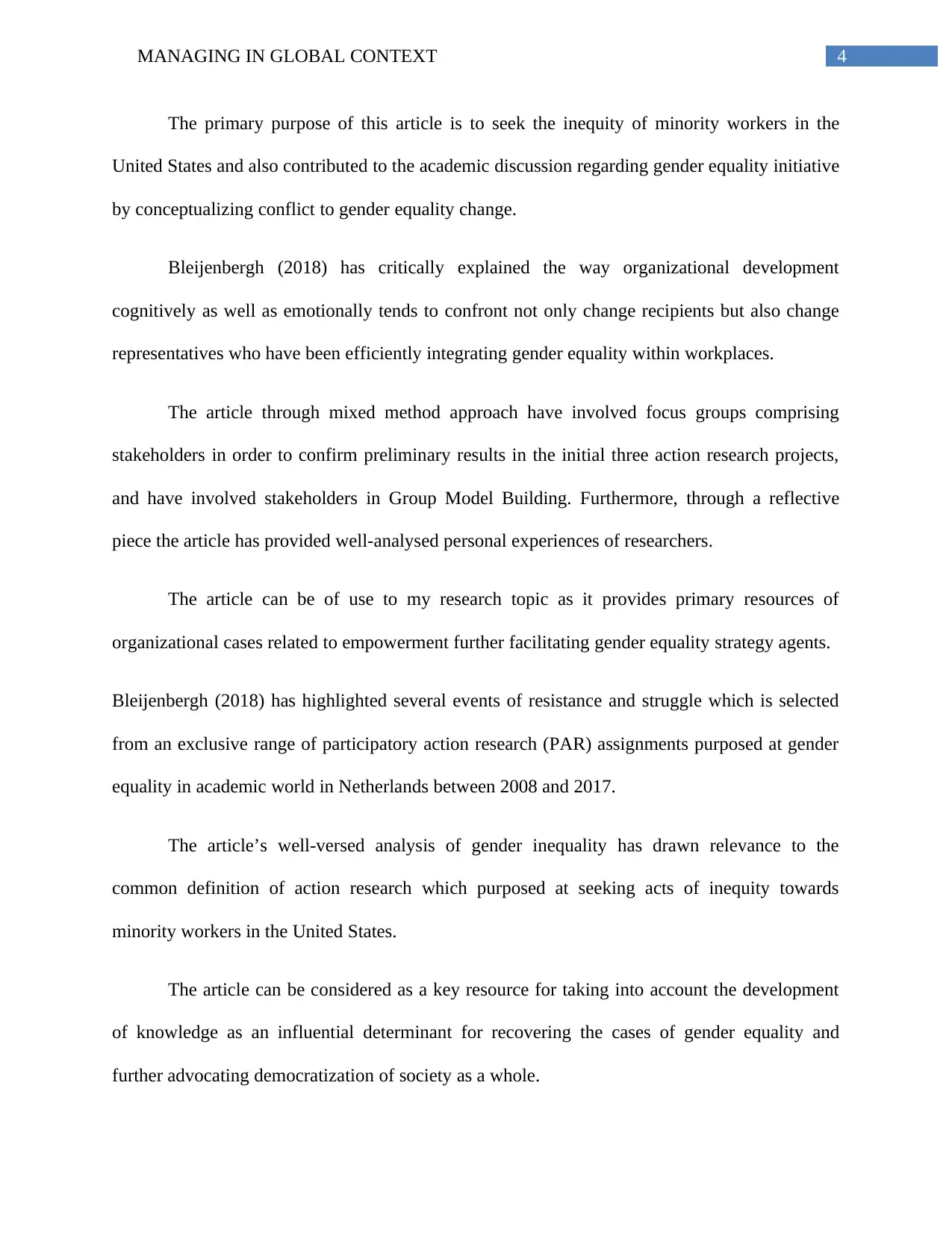
4MANAGING IN GLOBAL CONTEXT
The primary purpose of this article is to seek the inequity of minority workers in the
United States and also contributed to the academic discussion regarding gender equality initiative
by conceptualizing conflict to gender equality change.
Bleijenbergh (2018) has critically explained the way organizational development
cognitively as well as emotionally tends to confront not only change recipients but also change
representatives who have been efficiently integrating gender equality within workplaces.
The article through mixed method approach have involved focus groups comprising
stakeholders in order to confirm preliminary results in the initial three action research projects,
and have involved stakeholders in Group Model Building. Furthermore, through a reflective
piece the article has provided well-analysed personal experiences of researchers.
The article can be of use to my research topic as it provides primary resources of
organizational cases related to empowerment further facilitating gender equality strategy agents.
Bleijenbergh (2018) has highlighted several events of resistance and struggle which is selected
from an exclusive range of participatory action research (PAR) assignments purposed at gender
equality in academic world in Netherlands between 2008 and 2017.
The article’s well-versed analysis of gender inequality has drawn relevance to the
common definition of action research which purposed at seeking acts of inequity towards
minority workers in the United States.
The article can be considered as a key resource for taking into account the development
of knowledge as an influential determinant for recovering the cases of gender equality and
further advocating democratization of society as a whole.
The primary purpose of this article is to seek the inequity of minority workers in the
United States and also contributed to the academic discussion regarding gender equality initiative
by conceptualizing conflict to gender equality change.
Bleijenbergh (2018) has critically explained the way organizational development
cognitively as well as emotionally tends to confront not only change recipients but also change
representatives who have been efficiently integrating gender equality within workplaces.
The article through mixed method approach have involved focus groups comprising
stakeholders in order to confirm preliminary results in the initial three action research projects,
and have involved stakeholders in Group Model Building. Furthermore, through a reflective
piece the article has provided well-analysed personal experiences of researchers.
The article can be of use to my research topic as it provides primary resources of
organizational cases related to empowerment further facilitating gender equality strategy agents.
Bleijenbergh (2018) has highlighted several events of resistance and struggle which is selected
from an exclusive range of participatory action research (PAR) assignments purposed at gender
equality in academic world in Netherlands between 2008 and 2017.
The article’s well-versed analysis of gender inequality has drawn relevance to the
common definition of action research which purposed at seeking acts of inequity towards
minority workers in the United States.
The article can be considered as a key resource for taking into account the development
of knowledge as an influential determinant for recovering the cases of gender equality and
further advocating democratization of society as a whole.
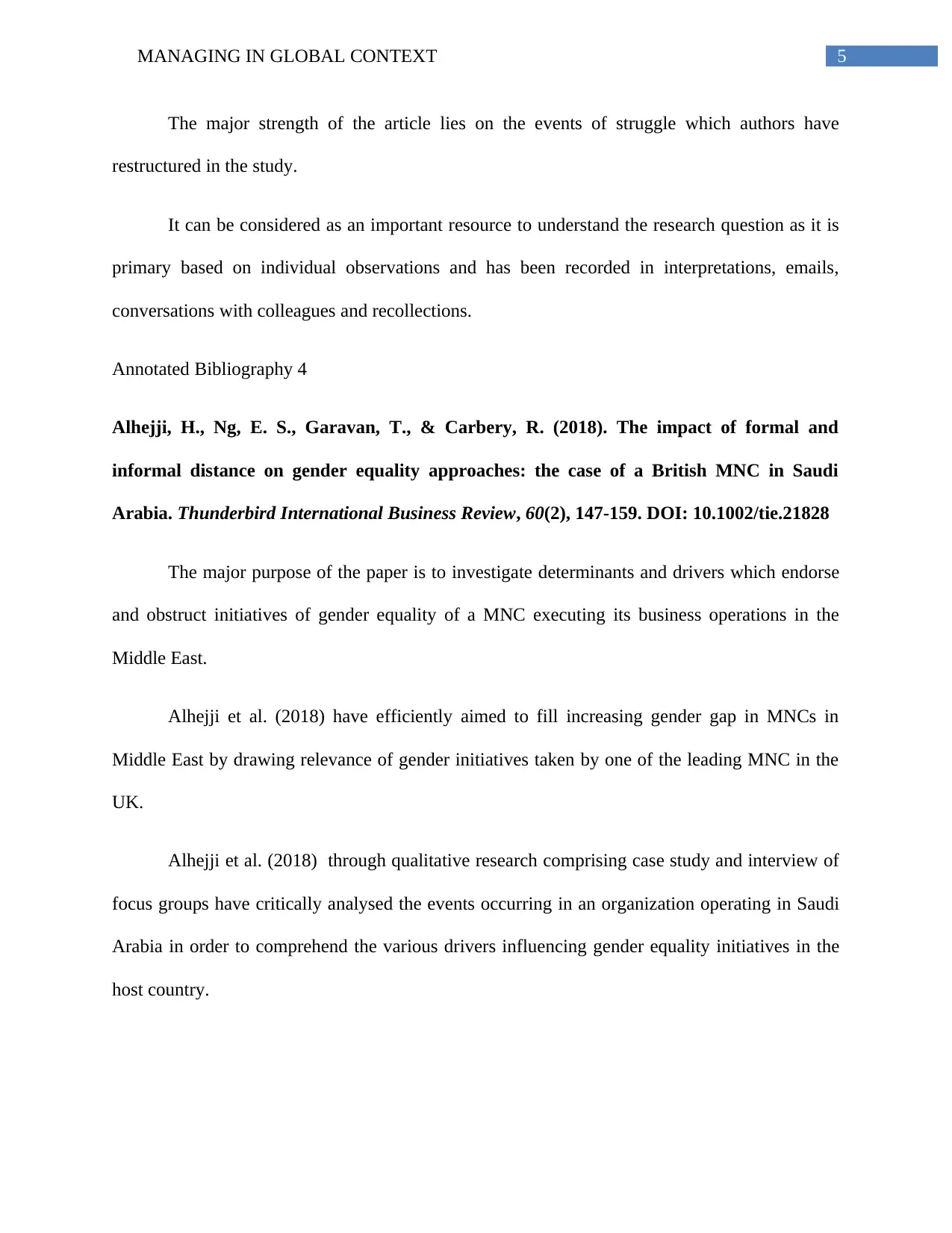
5MANAGING IN GLOBAL CONTEXT
The major strength of the article lies on the events of struggle which authors have
restructured in the study.
It can be considered as an important resource to understand the research question as it is
primary based on individual observations and has been recorded in interpretations, emails,
conversations with colleagues and recollections.
Annotated Bibliography 4
Alhejji, H., Ng, E. S., Garavan, T., & Carbery, R. (2018). The impact of formal and
informal distance on gender equality approaches: the case of a British MNC in Saudi
Arabia. Thunderbird International Business Review, 60(2), 147-159. DOI: 10.1002/tie.21828
The major purpose of the paper is to investigate determinants and drivers which endorse
and obstruct initiatives of gender equality of a MNC executing its business operations in the
Middle East.
Alhejji et al. (2018) have efficiently aimed to fill increasing gender gap in MNCs in
Middle East by drawing relevance of gender initiatives taken by one of the leading MNC in the
UK.
Alhejji et al. (2018) through qualitative research comprising case study and interview of
focus groups have critically analysed the events occurring in an organization operating in Saudi
Arabia in order to comprehend the various drivers influencing gender equality initiatives in the
host country.
The major strength of the article lies on the events of struggle which authors have
restructured in the study.
It can be considered as an important resource to understand the research question as it is
primary based on individual observations and has been recorded in interpretations, emails,
conversations with colleagues and recollections.
Annotated Bibliography 4
Alhejji, H., Ng, E. S., Garavan, T., & Carbery, R. (2018). The impact of formal and
informal distance on gender equality approaches: the case of a British MNC in Saudi
Arabia. Thunderbird International Business Review, 60(2), 147-159. DOI: 10.1002/tie.21828
The major purpose of the paper is to investigate determinants and drivers which endorse
and obstruct initiatives of gender equality of a MNC executing its business operations in the
Middle East.
Alhejji et al. (2018) have efficiently aimed to fill increasing gender gap in MNCs in
Middle East by drawing relevance of gender initiatives taken by one of the leading MNC in the
UK.
Alhejji et al. (2018) through qualitative research comprising case study and interview of
focus groups have critically analysed the events occurring in an organization operating in Saudi
Arabia in order to comprehend the various drivers influencing gender equality initiatives in the
host country.
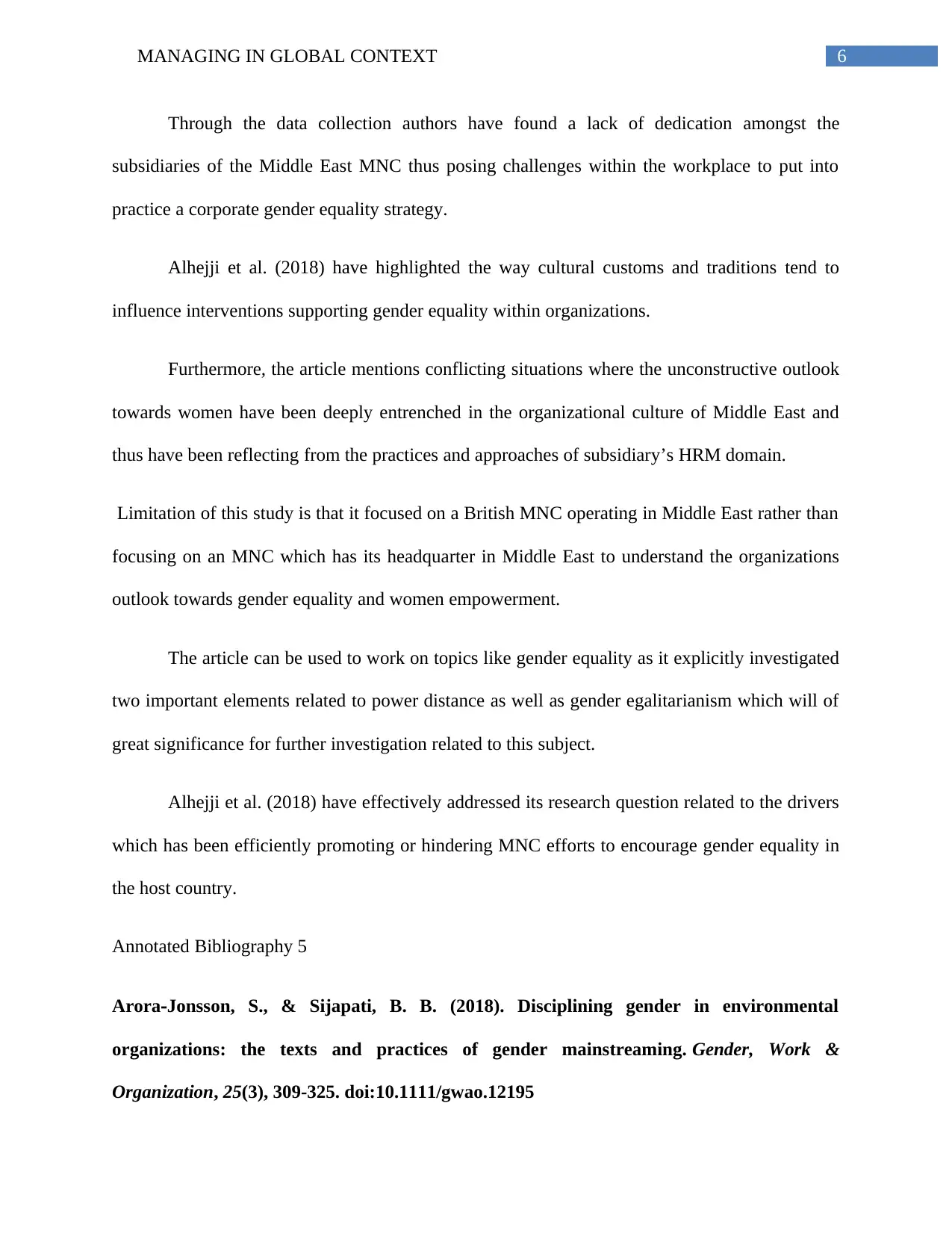
6MANAGING IN GLOBAL CONTEXT
Through the data collection authors have found a lack of dedication amongst the
subsidiaries of the Middle East MNC thus posing challenges within the workplace to put into
practice a corporate gender equality strategy.
Alhejji et al. (2018) have highlighted the way cultural customs and traditions tend to
influence interventions supporting gender equality within organizations.
Furthermore, the article mentions conflicting situations where the unconstructive outlook
towards women have been deeply entrenched in the organizational culture of Middle East and
thus have been reflecting from the practices and approaches of subsidiary’s HRM domain.
Limitation of this study is that it focused on a British MNC operating in Middle East rather than
focusing on an MNC which has its headquarter in Middle East to understand the organizations
outlook towards gender equality and women empowerment.
The article can be used to work on topics like gender equality as it explicitly investigated
two important elements related to power distance as well as gender egalitarianism which will of
great significance for further investigation related to this subject.
Alhejji et al. (2018) have effectively addressed its research question related to the drivers
which has been efficiently promoting or hindering MNC efforts to encourage gender equality in
the host country.
Annotated Bibliography 5
Arora‐Jonsson, S., & Sijapati, B. B. (2018). Disciplining gender in environmental
organizations: the texts and practices of gender mainstreaming. Gender, Work &
Organization, 25(3), 309-325. doi:10.1111/gwao.12195
Through the data collection authors have found a lack of dedication amongst the
subsidiaries of the Middle East MNC thus posing challenges within the workplace to put into
practice a corporate gender equality strategy.
Alhejji et al. (2018) have highlighted the way cultural customs and traditions tend to
influence interventions supporting gender equality within organizations.
Furthermore, the article mentions conflicting situations where the unconstructive outlook
towards women have been deeply entrenched in the organizational culture of Middle East and
thus have been reflecting from the practices and approaches of subsidiary’s HRM domain.
Limitation of this study is that it focused on a British MNC operating in Middle East rather than
focusing on an MNC which has its headquarter in Middle East to understand the organizations
outlook towards gender equality and women empowerment.
The article can be used to work on topics like gender equality as it explicitly investigated
two important elements related to power distance as well as gender egalitarianism which will of
great significance for further investigation related to this subject.
Alhejji et al. (2018) have effectively addressed its research question related to the drivers
which has been efficiently promoting or hindering MNC efforts to encourage gender equality in
the host country.
Annotated Bibliography 5
Arora‐Jonsson, S., & Sijapati, B. B. (2018). Disciplining gender in environmental
organizations: the texts and practices of gender mainstreaming. Gender, Work &
Organization, 25(3), 309-325. doi:10.1111/gwao.12195
Paraphrase This Document
Need a fresh take? Get an instant paraphrase of this document with our AI Paraphraser
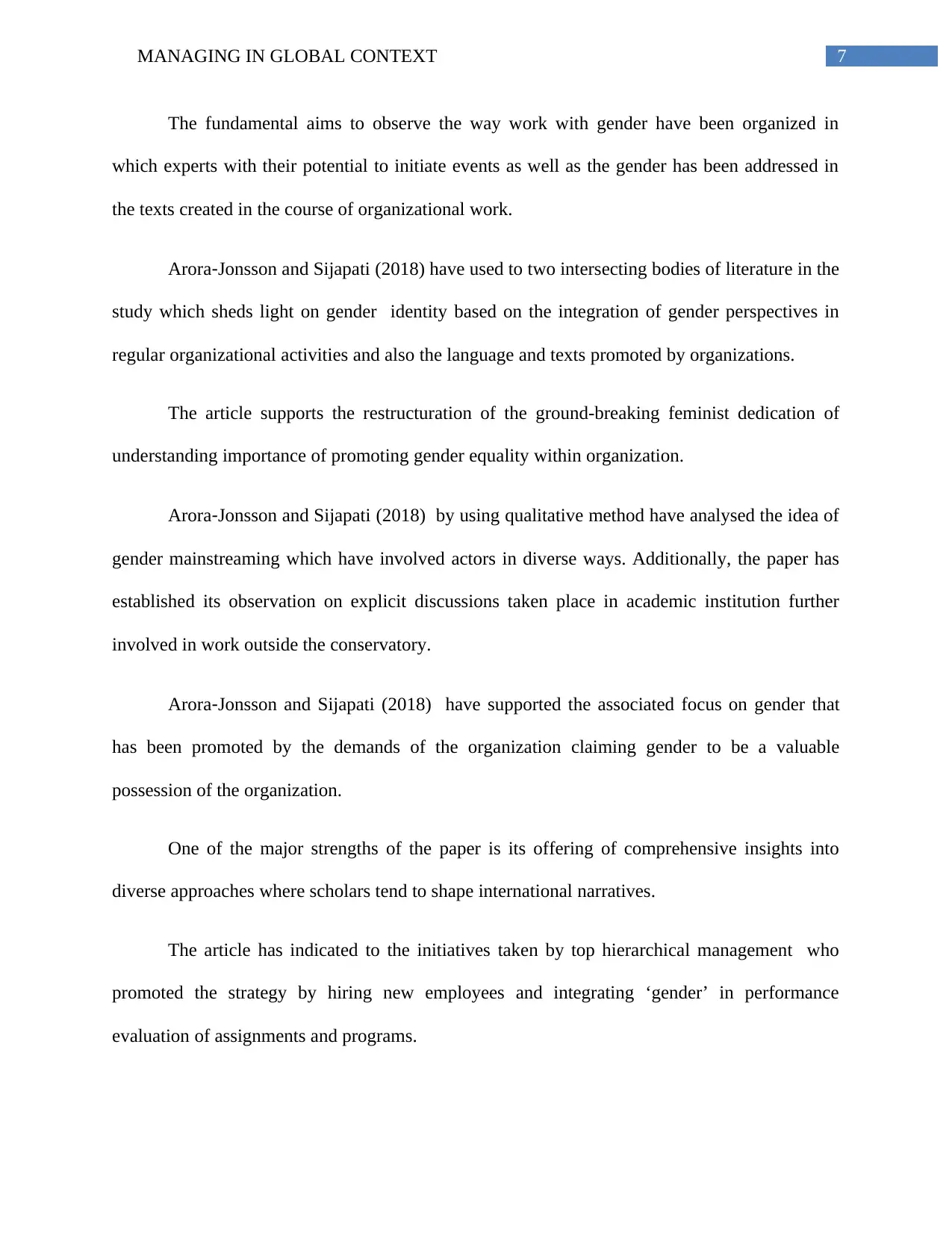
7MANAGING IN GLOBAL CONTEXT
The fundamental aims to observe the way work with gender have been organized in
which experts with their potential to initiate events as well as the gender has been addressed in
the texts created in the course of organizational work.
Arora‐Jonsson and Sijapati (2018) have used to two intersecting bodies of literature in the
study which sheds light on gender identity based on the integration of gender perspectives in
regular organizational activities and also the language and texts promoted by organizations.
The article supports the restructuration of the ground-breaking feminist dedication of
understanding importance of promoting gender equality within organization.
Arora‐Jonsson and Sijapati (2018) by using qualitative method have analysed the idea of
gender mainstreaming which have involved actors in diverse ways. Additionally, the paper has
established its observation on explicit discussions taken place in academic institution further
involved in work outside the conservatory.
Arora‐Jonsson and Sijapati (2018) have supported the associated focus on gender that
has been promoted by the demands of the organization claiming gender to be a valuable
possession of the organization.
One of the major strengths of the paper is its offering of comprehensive insights into
diverse approaches where scholars tend to shape international narratives.
The article has indicated to the initiatives taken by top hierarchical management who
promoted the strategy by hiring new employees and integrating ‘gender’ in performance
evaluation of assignments and programs.
The fundamental aims to observe the way work with gender have been organized in
which experts with their potential to initiate events as well as the gender has been addressed in
the texts created in the course of organizational work.
Arora‐Jonsson and Sijapati (2018) have used to two intersecting bodies of literature in the
study which sheds light on gender identity based on the integration of gender perspectives in
regular organizational activities and also the language and texts promoted by organizations.
The article supports the restructuration of the ground-breaking feminist dedication of
understanding importance of promoting gender equality within organization.
Arora‐Jonsson and Sijapati (2018) by using qualitative method have analysed the idea of
gender mainstreaming which have involved actors in diverse ways. Additionally, the paper has
established its observation on explicit discussions taken place in academic institution further
involved in work outside the conservatory.
Arora‐Jonsson and Sijapati (2018) have supported the associated focus on gender that
has been promoted by the demands of the organization claiming gender to be a valuable
possession of the organization.
One of the major strengths of the paper is its offering of comprehensive insights into
diverse approaches where scholars tend to shape international narratives.
The article has indicated to the initiatives taken by top hierarchical management who
promoted the strategy by hiring new employees and integrating ‘gender’ in performance
evaluation of assignments and programs.
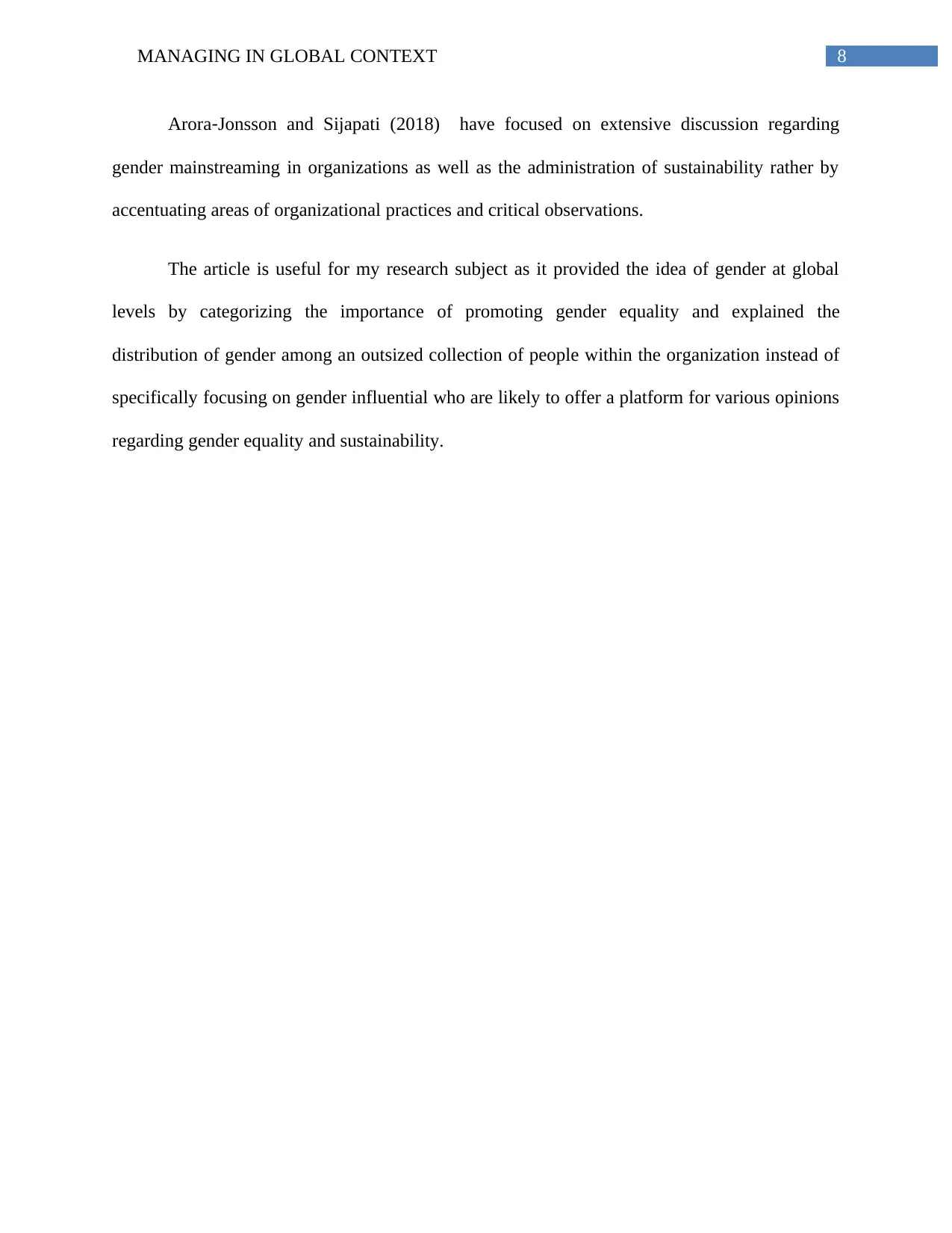
8MANAGING IN GLOBAL CONTEXT
Arora‐Jonsson and Sijapati (2018) have focused on extensive discussion regarding
gender mainstreaming in organizations as well as the administration of sustainability rather by
accentuating areas of organizational practices and critical observations.
The article is useful for my research subject as it provided the idea of gender at global
levels by categorizing the importance of promoting gender equality and explained the
distribution of gender among an outsized collection of people within the organization instead of
specifically focusing on gender influential who are likely to offer a platform for various opinions
regarding gender equality and sustainability.
Arora‐Jonsson and Sijapati (2018) have focused on extensive discussion regarding
gender mainstreaming in organizations as well as the administration of sustainability rather by
accentuating areas of organizational practices and critical observations.
The article is useful for my research subject as it provided the idea of gender at global
levels by categorizing the importance of promoting gender equality and explained the
distribution of gender among an outsized collection of people within the organization instead of
specifically focusing on gender influential who are likely to offer a platform for various opinions
regarding gender equality and sustainability.
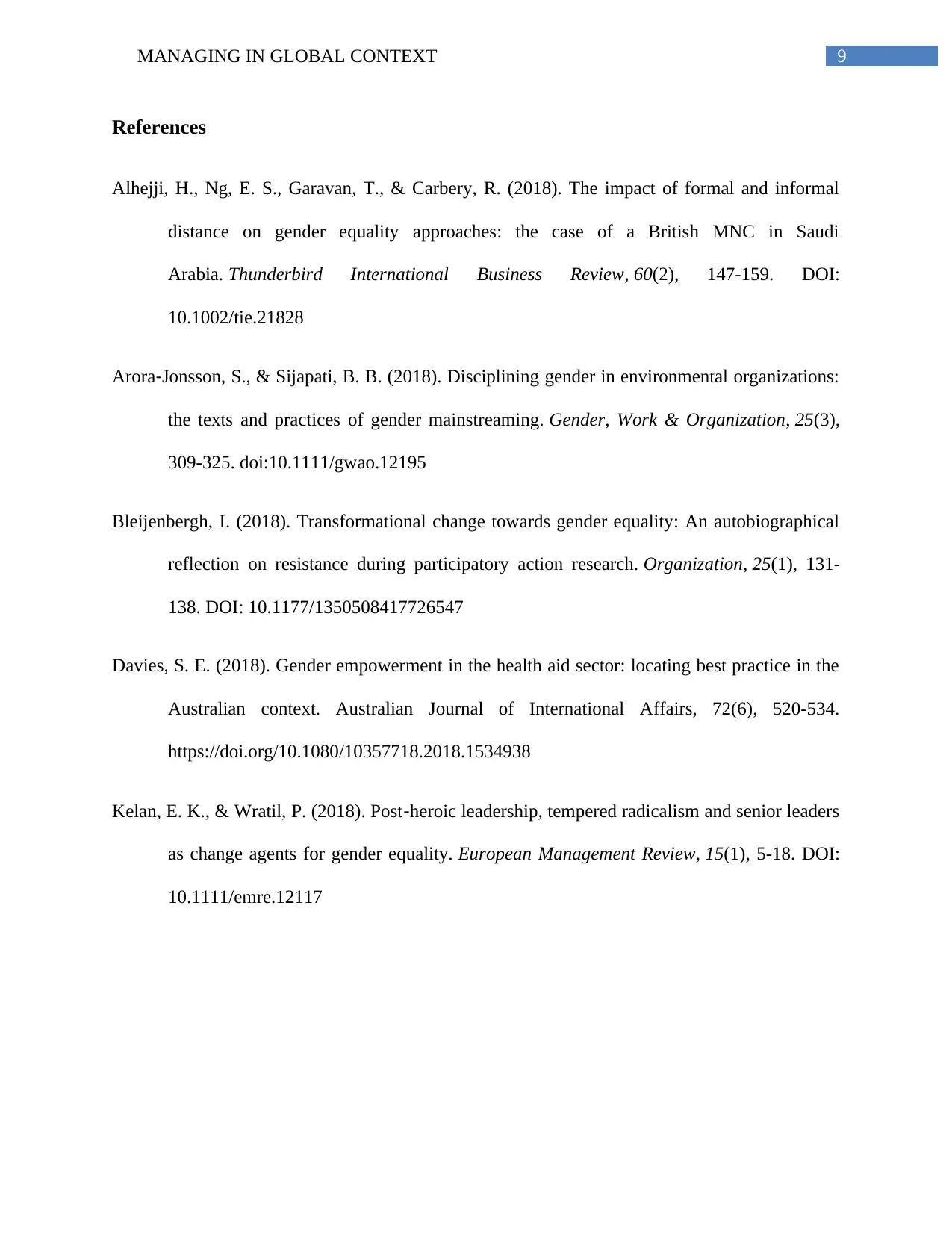
9MANAGING IN GLOBAL CONTEXT
References
Alhejji, H., Ng, E. S., Garavan, T., & Carbery, R. (2018). The impact of formal and informal
distance on gender equality approaches: the case of a British MNC in Saudi
Arabia. Thunderbird International Business Review, 60(2), 147-159. DOI:
10.1002/tie.21828
Arora‐Jonsson, S., & Sijapati, B. B. (2018). Disciplining gender in environmental organizations:
the texts and practices of gender mainstreaming. Gender, Work & Organization, 25(3),
309-325. doi:10.1111/gwao.12195
Bleijenbergh, I. (2018). Transformational change towards gender equality: An autobiographical
reflection on resistance during participatory action research. Organization, 25(1), 131-
138. DOI: 10.1177/1350508417726547
Davies, S. E. (2018). Gender empowerment in the health aid sector: locating best practice in the
Australian context. Australian Journal of International Affairs, 72(6), 520-534.
https://doi.org/10.1080/10357718.2018.1534938
Kelan, E. K., & Wratil, P. (2018). Post‐heroic leadership, tempered radicalism and senior leaders
as change agents for gender equality. European Management Review, 15(1), 5-18. DOI:
10.1111/emre.12117
References
Alhejji, H., Ng, E. S., Garavan, T., & Carbery, R. (2018). The impact of formal and informal
distance on gender equality approaches: the case of a British MNC in Saudi
Arabia. Thunderbird International Business Review, 60(2), 147-159. DOI:
10.1002/tie.21828
Arora‐Jonsson, S., & Sijapati, B. B. (2018). Disciplining gender in environmental organizations:
the texts and practices of gender mainstreaming. Gender, Work & Organization, 25(3),
309-325. doi:10.1111/gwao.12195
Bleijenbergh, I. (2018). Transformational change towards gender equality: An autobiographical
reflection on resistance during participatory action research. Organization, 25(1), 131-
138. DOI: 10.1177/1350508417726547
Davies, S. E. (2018). Gender empowerment in the health aid sector: locating best practice in the
Australian context. Australian Journal of International Affairs, 72(6), 520-534.
https://doi.org/10.1080/10357718.2018.1534938
Kelan, E. K., & Wratil, P. (2018). Post‐heroic leadership, tempered radicalism and senior leaders
as change agents for gender equality. European Management Review, 15(1), 5-18. DOI:
10.1111/emre.12117
1 out of 10
Your All-in-One AI-Powered Toolkit for Academic Success.
+13062052269
info@desklib.com
Available 24*7 on WhatsApp / Email
![[object Object]](/_next/static/media/star-bottom.7253800d.svg)
Unlock your academic potential
© 2024 | Zucol Services PVT LTD | All rights reserved.
